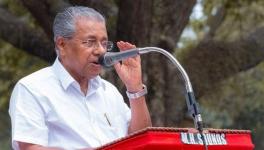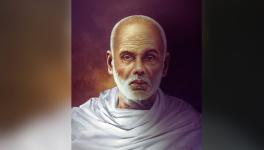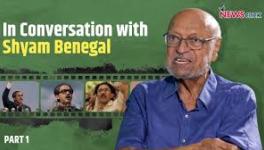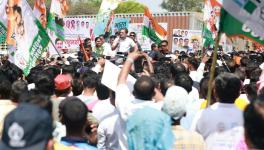Sangh Parivar Using Moplah Rebellion to Ignite ‘Threat’ From Indian Muslims

Two recent formulations on history made from the highest echelons of the Rashtriya Swayamsevak Sangh (RSS) are not just highly distorted, but also indicative of how untrue or half-true versions of the past are integral to the Sangh Parivar's strategy to discomfit the Indian majority community regarding Muslim presence in public life.
Recent developments in Afghanistan, precipitated by the United States' decision to pull out from an untenable and unwinnable war, has provided Hindu religio-cultural forces to deepen dislike, prejudice, hatred and suspicion about the reality and inalterability of Muslim presence in India.
There is widespread social consensus that Indian Muslims remained, except in the isolated cases, disinterested in ideas that spawned terms like Jihadi or Islamic terrorism. Despite this, the Sangh Parivar consistently runs a campaign portraying the Indian Muslims and global Islamic community as sharing a client-patron relationship.
It is contended that every expression of anguish of Indian Muslims is instilled in their minds by co-religionists outside India, and vice versa. Indian Muslims are pan-Islamists, the argument goes. Despite their lip-service to Mahatma Gandhi and his conscious choice to broaden the social base of the national movement, the support for the Khilafat Movement, launched following the end of World War I and the British decision to abolish the Islamic Caliphate is cited as an instance of Indian Muslims being driven by extra-territorial sentiments.
Last month, one-time RSS poster-boy, now in the process of being rehabilitated in the political hierarchy of the Sangh Parivar after a couple of years in the wilderness, Ram Madhav upped the ante against Indian Muslims by linking them with developments in Afghanistan.
Drawing attention to atrocities being committed by the Taliban, he said that the "Talibani mindset" is a century-old in India and first manifested itself in the Moplah (or Mapillas) Uprisings or Rebellion in the Malabar region of Kerala. He added that the same sentiment led to Partition in 1947. In a statement that underscored his skewed understanding of the Taliban and Indian history, Madhav said, "Talibanism has become a streak in the country and every time whitewashing happens."
Close on the heels of the latest edition of a century-old one-sided narrative, depicting events in the Malabar region as "the biggest Muslim attack on the Hindus after the Muslim rule," the RSS chief, Mohan Bhagwat, provided another example of the ease with which the Sangh Parivar looks only at those historical strands which further its contemporary agenda.
While participating in a seminar organised by an associate organisation, Bhagwat asserted the "Islam came to Bharat with invaders. This is a historical fact, and it is necessary for this to be stated as such." This was yet another instance of the Sangh Parivar's selectiveness when it comes to history and presenting a uni-dimensional view of the past.
The fact is that Islam in India came by three distinct gateways - trade, Sufism and the martial route, or what Bhagwat and his ilk prefer to term as invaders. By ignoring the other two pathways of Islam, the Sangh Parivar deliberately propagates the myth that the heritage of today's Muslims can be traced to the violent usurpation of political power.
Attempts to link today's Muslims to these so-labelled 'invader kings', is part of the tactic to whip up anger and hatred for them in contemporary India. The RSS and its affiliates conceal the fact that early Persian and Arab traders settled in certain parts of India even before the rise of Islam in Arabia. Later, they settled as Muslims, not as pre-Islamic Arabs and Persians like earlier, from at least the ninth century, first in coastal Kerala and later in other parts of India, including in the north where every Muslim is labelled as 'descendants of invaders'.
Muslim settlers, traders, religious missionaries, soldiers, noblemen and other commoners who made this land their homes, married in India and soon there grew a large indigenous Muslim community that was distinct, in terms of social hierarchy, from the immigrant settlers. The Moplahs was the name given to Malayali Muslims based out of the Malabar region and the region became the place of the major uprising or revolt that has been variously interpreted for a century.
The first communal spin on the Mappila Uprising was given by the early Hindu nationalists even before the formation of the RSS in 1925. The back story to this starts when Mahatma Gandhi returned to India in 1915. Initially, this lot, including KB Hedgewar (eventually RSS founder) and his mentor BS Moonje, were comfortable with Gandhi's politics because he advocated tapasya and satyagraha. However, Hedgewar was not at ease with Gandhi's insistence on non-violence in every form of protest. His view was that ahimsa in the political domain would weaken Hindus and enable Muslims to ride roughshod over the 'original dwellers' of India.
When Gandhi embraced the Khilafat Movement into the national movement alongside the Non-Cooperation Movement, Hedgewar and others of his ilk, began distancing from the Congress, especially Gandhi. He was of the view that Gandhi was over-emphasising the need to forge Hindu-Muslim unity. Hedgewar was in jail when the Moplah revolt broke out. At that point, Moonje led a team of Hindu nationalists to investigate.
His report raised Hindu fears in the Nagpur region by stating that the incident was nothing but a case of forced conversion. In the wake of his report, Arya Samaj missionary, Swami Shraddhananda initiated a highly provocative shuddhi or purification/reconversion movement in the region.
The Swami later deposed before the Moonje Commission, and his view enabled Hedgewar to firm up his still nascent viewpoint that 'Hindus are not as well organised as the Muslims, and are divided among themselves. The only solution to the problem is for Hindu leaders to organise their own society.' Hedgewar eventually established the RSS in September 1925 but not before playing a pivotal role in the Nagpur riots a year earlier.
If seeing the Moplah Uprising solely from the communal perspective was the catalyst in the eventual formation of RSS and the large-scale reconversions by Shraddhananda (also by Hedgewar who undertook to reconvert orphans in Christian missionary shelters), a hundred years later, its depiction as being the 'global originator' of the "Taliban mindset" is aimed at diverting the attention of people from fundamental maters of survival, in terms of health as well as the economy in the wake of the brutal onslaught of the Covid-19 pandemic and the government's ineptitude to tackle the situation.
The purpose is simple; keep people enmeshed up in the tangle of feared 'threat' from Indian Muslims, their collaborators within the country (opposition parties, non-embedded sections of media, liberal and leftist groups and of course the civil society), and global Jihadi terrorist groups. People are then encouraged by humungous publicity machinery to see the Sangh Parivar and this government as their only 'saviour'.
Like several historical events, it is unwise to explore the complex Moplah Uprisings from a single perspective, as being triggered by just one factor. What then was the Mappila insurrection? Was it an intense anti-colonial struggle, inspired by the Non-Cooperation -- Khilafat Movements, or was it a representative of class struggle, or was it a communal clash that resulted in a 'Hindu genocide'? Was the incident merely one of these, or was it the impact of a case of a little bit of each of these?
The divergence in the secular and communal assessment of the incidents is rooted in history. A September 1921 Congress Working Committee resolution was mildly critical of the Moplahs for not being "strictly non-violent". Yet, the groups were not criticised for communal violence. They were instead termed as being "among the bravest in the land." Gandhi however, said that Muslims must "naturally feel the shame and humiliation of the Moplah conduct about forcible conversions and looting."
But the assessment of Saumyendranath Tagore, founder of the Revolutionary Communist Party of India, was different. For him, the episode was "the greatest manifestation of spontaneous mass upheaval in the first quarter of this century, against British Imperialism."
The issue of multiple assessments of the incidents was taken up by the Communist Party of India in August 1946 on the 25th anniversary of the events. A resolution, 1921: The Call and the Warning, was adopted in this meeting of Travancore, Cochin and Malabar committees of the party. It was elaborated upon by EMS Namboodripad in a pamphlet with the same title. In a paper in The Marxists in January-March 2014, Pinnari Vijayan wrote, "British decided to ban Deshabhimani for publishing this. The newspaper was banned for analyzing the Malabar rebellion in its true sense. When League and Congress denounced the Malabar Rebellion, its true nature was put forward by the Communists. Some communal elements interpret the Rebellion as a mad frenzy of Mappilas as was done by the British."
In his 1943 essay, A Short History of the Peasant Movement in Malabar, EMS posed a question which he went on to answer - "what then was the main force which led to the outbreak of 1921? So-called Marxists would say it was agrarian discontent. Nor do I wish to contradict it. Had it not been for agrarian discontent...the Moplah would not have rallied around the Khilafat and Congress flags in such large numbers and with such firm determination....Every speech of every Congress-cum-Khilafat leader was a two-edged weapon against both the British government as well as the jenmi (landed aristocracy of Kerala). It was this that gave new hope and a new slogan to the oppressed Moplah...It was a fine example of an agrarian mass political movement."
But EMS did not shy from viewing the episode from a troubling perspective: "Why was it that the movement was confined to a Moplah majority area?... Oppression and exploitation of the jenmi and officials are as bad for Hindu peasants as for their Moplah comrades. Why is it then that the Moplah peasants rose to almost every man while the Hindu peasants fell victim to the propaganda that the rising was not anti-jenmi or anti-government but was anti-Hindu? It cannot be denied that Hindus kept aloof...And, finally, why is it that a certain number of forced conversions took place, which I have remarked before, cannot by any stretch imagination be explained away as part of a purely agrarian movement?"
In his broadside against Kerala's Left Front government for its decision to mark the centenary of the Moplah Uprising, Ram Madhav while using the term of "communist schizofascism" quoted EMS, but only partially, just as his Parivar picks and chooses historical narratives.
A hundred years after the important chapter in the course of the national movement, it is important to recognise that the Moplah Rebellion was certainly a chapter in people's anti-colonial struggle. Simultaneously it was an expression against class oppression. But, it was also accompanied by several troubling issues that EMS and other leaders and progressive academicians have detailed in much detail. Like several other episodes of the freedom struggle, along with the glorious, there remain several elements that continue to trouble us.
The writer is an NCR-based author and journalist. His books include The RSS: Icons of the Indian Right and Narendra Modi: The Man, The Times. He tweets at @NilanjanUdwin
Get the latest reports & analysis with people's perspective on Protests, movements & deep analytical videos, discussions of the current affairs in your Telegram app. Subscribe to NewsClick's Telegram channel & get Real-Time updates on stories, as they get published on our website.
























